“By recommending that we balance our choices in biological (diet and exercise), psychological (stress control), social (relationships) and spiritual components in our lives, (Dr. Daniel Amen) provides a desperately needed roadmap to maximize brain health.” Joseph C Maroon, MD from Dr. Daniel Amen’s book, The End of Mental Illness that we will dive deeper into on today’s episode.
On today’s episode #301 we will cover:
✔ A review of EP #128 of Dr. Daniel Amen's book, The End of Mental Illness.
✔ An overview of Season 10 with Mental and Physical Health at the Top of Our List.
✔ What do Dr. Caroline Leaf and Dr. Daniel Amen have in common this month?
✔ How Andrea first learned about Dr. Leaf's work, and where they both spoke together.
✔ What Dr. Amen is focused on TODAY.
✔ What Dr. Leaf is focused on TODAY.
✔ How we can better prepare ourselves to help our next generation with their mental and physical health.
✔ The 4 circles of Wellness.
✔ How to Manage Our Mind Using Dr. Leaf and Dr. Amen's work together.
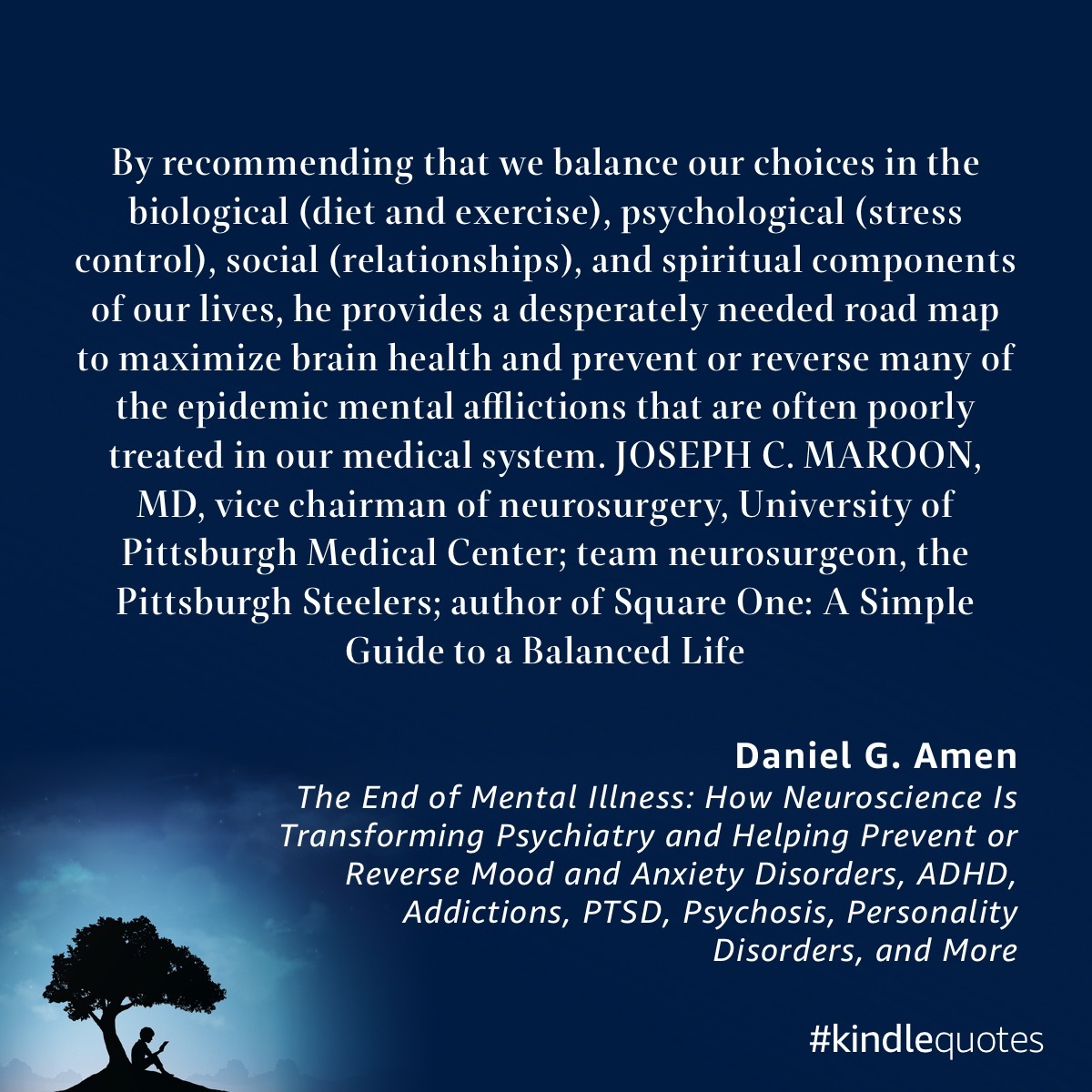
Welcome back to The Neuroscience Meets Social and Emotional Learning Podcast, where we connect the science-based evidence behind social and emotional learning (that’s finally being taught in our schools today) and emotional intelligence training (used in our modern workplaces) for improved well-being, achievement, productivity and results—using what I saw as the missing link (since we weren’t taught this when we were growing up in school), the application of practical neuroscience. I’m Andrea Samadi, an author, and an educator with a passion for learning and launched this podcast 5 years ago with the goal of bringing ALL the leading experts together (in one place) to uncover the most current research that would back up how the brain learns best, taking us ALL to new, and often unimaginable heights.
INTRODUCTION:
For today’s episode, #301, and in keeping with our Season Theme of Going Back to the Basics, I’m going back to EPISODE #128[i] A Review of Dr. Daniel Amen’s Book The End of Mental Illness to see if we can dive deeper here, and add more to this episode than the 6 steps we covered two years ago for improving our brain health, which we know is integral for our mental health. As I’m looking back over our past episodes, you can see a graphic in the show notes of the direction I want to take us moving forward as we go back over some of our past Brain Fact Fridays and see what we can add to them, or what’s new, to move us forward. When we first launched this podcast, I had a vision of connecting the most current brain research that I called Neuroscience 101 to our 6 social and emotional learning competencies to improve our well-being, productivity and results.
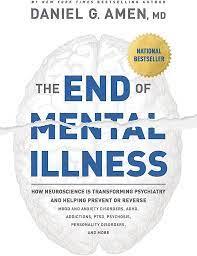
PUTTING OUR MENTAL AND PHYSICAL HEALTH FIRST:
Now, in Season 10 we’ve all graduated from the basics, and are building on this knowledge together, and I’m noticing what’s IMPORTANT that needs to be at the Top of our list moving forward.
These important topics I’ve called Neuroscience 202 that will take us deeper than where we first began and I’ve put Mental and Physical Health at the top of our list.
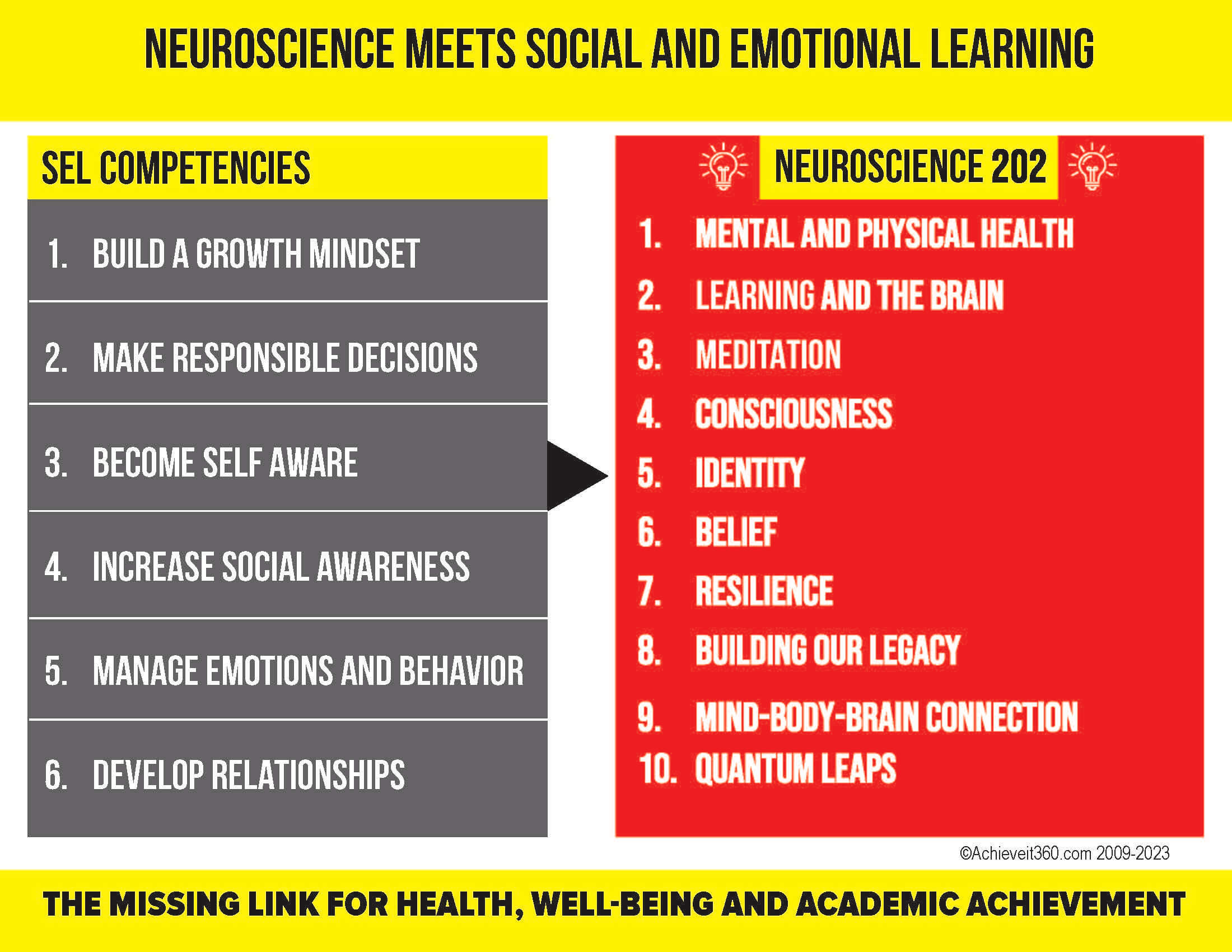
MEDICAL DISCLAIMER: Just a reminder that I am not a medical doctor, and if you are struggling with your mental health, please do consult with a medical doctor. I’m not offering medical advice here, but am sharing the results I’ve personally obtained from studying and applying the tips that Dr. Daniel Amen suggests in his book The End of Mental Illness and then will connect his work to Dr. Carolyn Leaf’s. My hope is that the strategies we uncover can help others, who might find themselves stuck, with some NEW ideas that I’ve used myself to access peace of mind, during times of high stress. And with the goal that once we master these strategies ourselves, that we extend them to others to help them with whatever they might be struggling with. This specifically includes our children.
CONNECTING DR. AMEN TO DR. CAROLINE LEAF:
When I looked back at my review of Dr. Daniel Amen’s book The End of Mental Illness, that I covered in May of 2021, I wondered what I could add to this episode, to take our understanding a bit deeper when it comes to taking control of our mental health. This is Dr. Amen’s life’s work. He has been on a mission to take the stigma out of term Mental Illness for decades. He says most of us will have a mental health issue in our lifetime—and that “normal” is a myth..that 51% of us will have a mental health issue (post-traumatic stress, depression, anxiety, addiction, an eating disorder)”[ii] which shows me clearly that it’s more normal to have a problem, than not. This became obvious to me when I started asking some trauma experts, and even past podcast guests, about what strategies they have used for their own children to help with the pressures they face in today’s world. They all gave me tips and ideas, telling me that anxiety and depression is the norm with our children these days.
This led me to go back to my review of Dr. Caroline Leaf’s Cleaning Up Your Mental Mess book and Neurocycle App, on EPISODE #299[iii] with the timely release of her new book, How to Help Your Child Clean up Their Mental Mess that she just released at the start of this month. Then I noticed that Dr. Daniel Amen has just released a BRAND-NEW course called Brain Thrive (PreK-1)[iv] to help with the prevention of mental health issues for children. Dr. Amen’s timely release of this course reminded me once again that this is a topic is important to pay attention to. It’s not an accident that Dr. Caroline Leaf released her book for children just last week, and now Dr. Amen releases an online course for children to learn these strategies. I’m definitely paying attention, and from the interest we received from our Deep Dive into Dr. Leaf’s work, I know that so are you.
I know that you’ll know these statistics, but here’s a reminder.
- 1 in 5 children will struggle with mental health in their lifetime. And that 17.1 million youth under the age of 18 have had a mental health problem. (Dr. Daniel Amen).
- Suicide is the 2nd leading cause of death for people ages 10-14 and 20-34.[v]
Before I add something new to Dr. Amen’s episode from 2 years ago, I did want to mention that it was through Dr. Amen that I came across Dr. Carolyn Leaf’s work. She talks openly on Dr. Amen’s Brain Warrior Way Podcast[vi] about how many years she has been using this scientifically proven 5 STEP approach to help people all over the world to clean up their mental mess. I was lucky enough to have the chance to speak on a webinar with Dr. Leaf on Podbean’s Wellness week, where I released an episode I’d written on “What Everyone Should Know About the Top 10 Mental Health Staples to Accelerate Productivity and Results.”[vii] One of the sessions I had a co-presentation with Dr. Leaf and John Kim, (a writer and speaker known as The Angry Therapist). Since I had already heard about Dr. Leaf’s work through Dr. Amen, I quickly reached out to interview her, and this is where the work began.
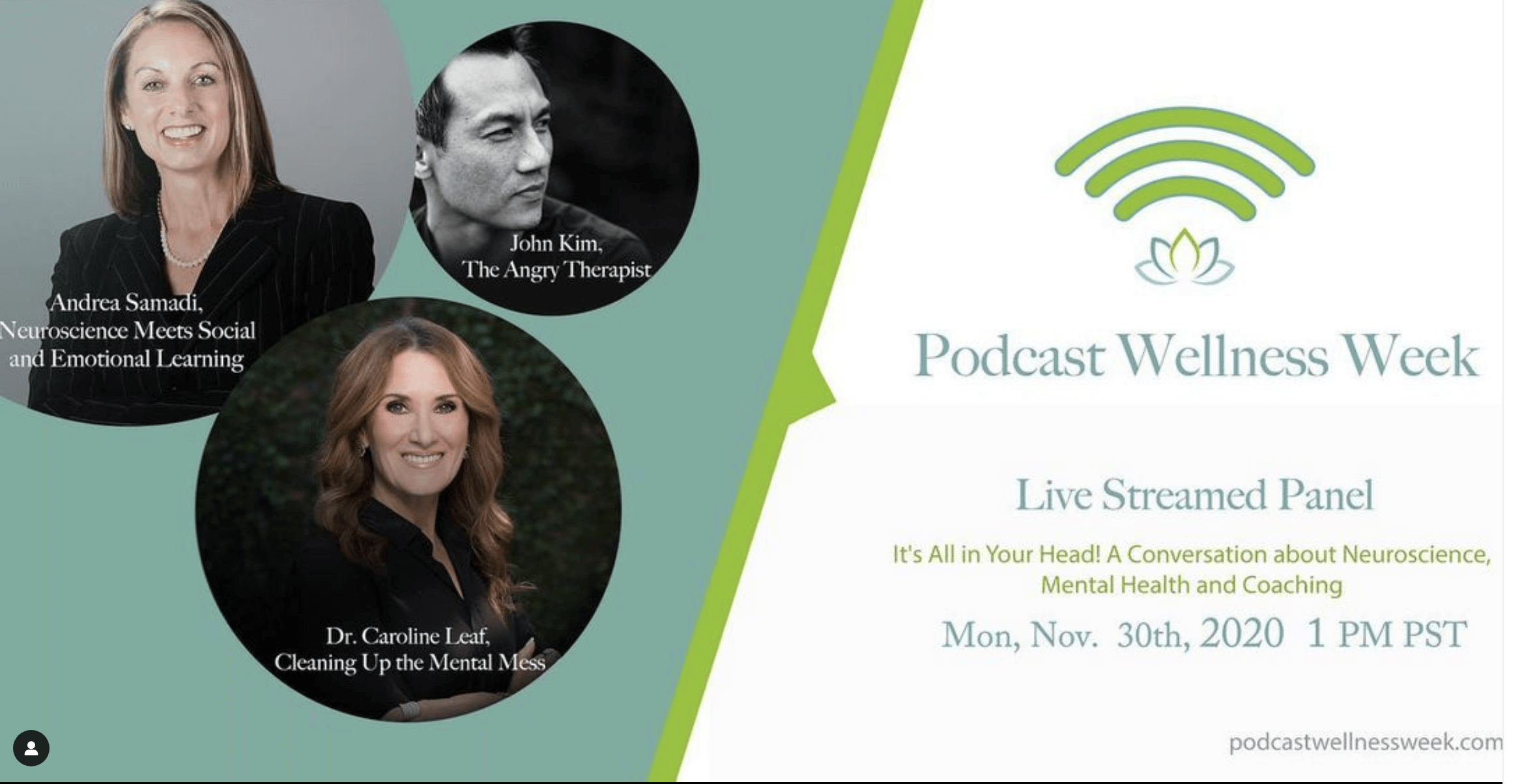
Our mental health is a lot like our physical health. We can coast along doing well, until one day, something happens, and we release we could have done a better job at managing our health overall.
I’m sure you’ve heard this quote before…
“If you don’t pay attention to your health now, some day, your health (either mental of physical) will get your attention” showing us all that prevention is vital.
CLEANING UP OUR MENTAL MESS:
While writing this episode, I glanced over at Dr. Amen’s Instagram account, (a bit because I still look at my phone from time to time while writing) but also to see what he was focused on today, and I noticed that he’s on the same mission as he was 2 years ago, helping the world to put their mental health first, which was obvious with the new course for children he’s just released. He had posted a graphic that showed an image of a messed-up mind (drawn like a colorful ball) representing a mind full of anxiety, loneliness, worry, guilt, fears and negative self-talk and he asked his audience “What else would you add to this image?” People from around the globe added things like “self-sabotaging, obsessive thinking, paranoia, being reactive to everything, isolation, dark thoughts, self-doubt, sadness, overwhelm, anger and procrastination” to name a few of their additions. This post caught my attention and made me think that no one is exempt from having a messy mind, and we covered the 5 scientifically proven steps that Dr. Carolyn Leaf suggests on EP299[viii] so that we as parents, teachers, coaches can keep our minds free of mental mess, before helping others.
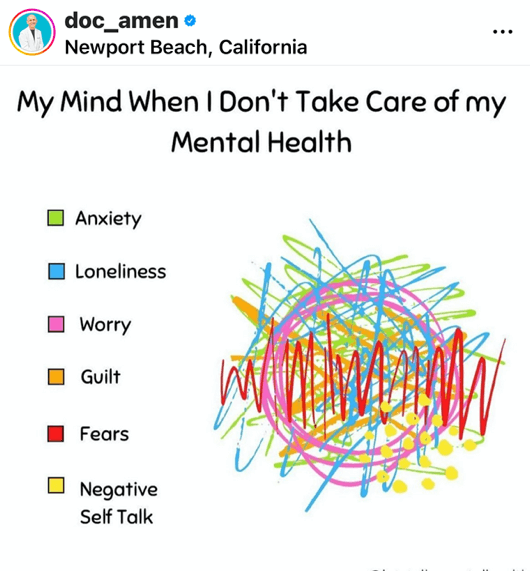
I can’t recommend these 5 steps enough, and the use of her Neurocycle APP to help us to work on cleaning up our toxic thoughts not by suppressing them, or pretending they aren’t there by replacing them with happy thoughts, (which is just like putting a band aid on them) but by doing the really difficult work of digging straight to the root cause of whatever it is that is messing up our mind, drawing these thoughts out of the depths of our hidden subconscious mind, into our conscious mind, so we can deal with them, by recognizing why we have these thoughts in the first place. In Dr. Leaf’s NEW book, How to Help Your Child Clean Up Their Mental Mess, that I will review once I’ve thoroughly practiced all her suggestions in this new book, she explains that these “mental messes” we all have look like dead trees in our mind, and that these messes are not bad, but they act as warning signals for us to do something differently to build a healthy tree in our mind. I think this is a powerful analogy, or just another way of looking at what happens to our mind when we don’t clean it up, and I know that once I understand this process myself, I’ll be better able to help others, including those closest to me who need it.
If I look at Dr. Amen’s messy ball that shows what a mind that isn’t managed looks like, or even Dr. Leaf’s dead tree idea, I know that there is hope forward with these strategies and once we’ve mastered them, it will be easier to teach them to others. But Cleaning Up Our Mental Mess, or by putting our brain health first, takes some thought and isn’t something we have been trained to do. There was never a mind-management class when I went to school, or a brain-health course in our PE classes. I do know that many are focused on integrated these ideas into our future classroom curriculums, but for those of us who haven’t learned this yet, this is something we all just must learn on our own, so we can proactively move our own needle towards health and wellness, through the lens of prevention.
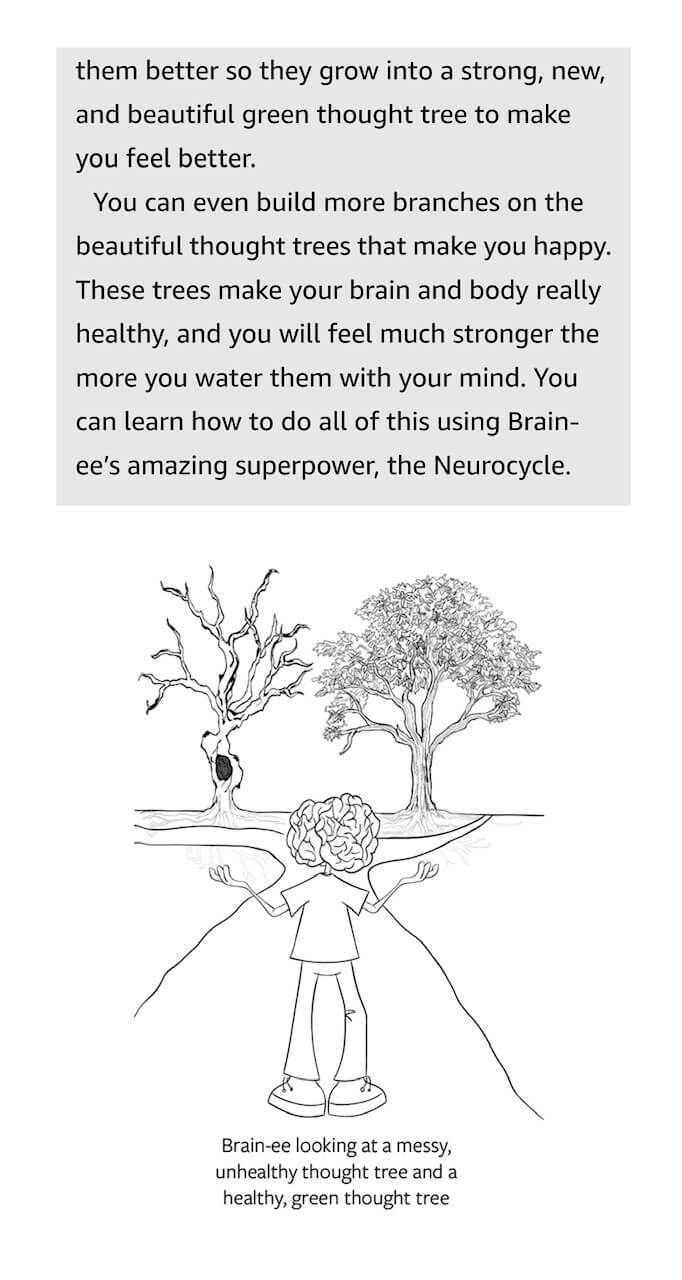
IMAGE CREDIT: Dr. Caroline Leaf's "How to Help Your Child Clean Up Their Mental Mess"
ANDREA’S NOTES: You can see my metacog drawing in the show notes which explains how I’m progressing through Dr. Leaf’s 5 STEP process using her Neurocycle APP, and managing my mind. We did review this process on EP #299 in depth. The idea is that once we have identified the main worry or anxiety that we have (the toxic thought) that will cause our mind to look like the dead tree over time if it isn’t managed, that we then go through this scientifically proven 5 step process that reconceptualizes the old toxic thought, turning it into a stronger, healthier thought over time with understanding.
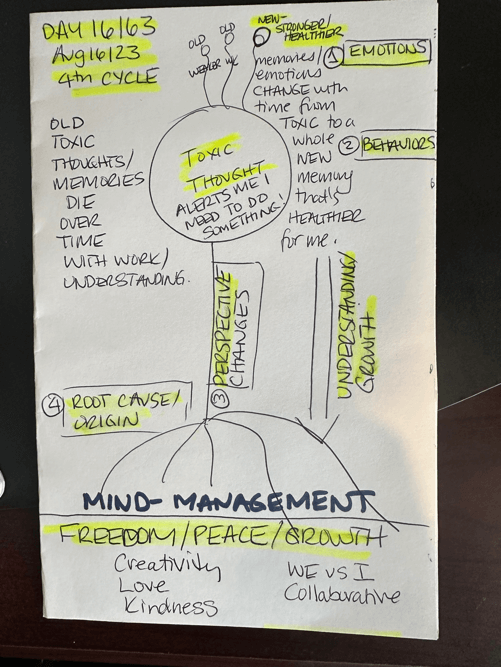
You can see how I’ve drawn little buds showing how my old toxic thoughts are getting weaker with time, as I’m using my own mind to create NEW stronger and healthier thoughts. I’m currently on day 16/63 working through a current issue, and I can say that at about the two-week mark, I did notice my mind shifting from being worried about this problem, to feeling more in control of it, and even positive visions of the future where I can look back and not be bothered at all with this problem. This changes the emotions that I feel attached to whatever I was worrying about, which changes my behaviors, and then when I step back, my perspective of it all changes. I can even dig deep into the root cause, and see where my worry came from (and it’s not a bad thing-it’s just alerting me to do something different and not just suppress what I’m worrying about) which we know causes more dis-ease. This all leads me to freedom, peace of mind, and growth. It’s such a beautiful process, and I can’t wait to walk my own children through these steps moving forward, so that they build mind-management into their lives and futures.
Once we’ve got the hang of these practices for improved mental and physical health, we can then role model the way for our next generation like Dr. Amen and Dr. Leaf are doing with their work. Children at the preschool levels can understand the importance of mind-management, and Dr. Leaf and Dr. Amen see how important this topic is right now.
YOU CAN’T GIVE WHAT YOU HAVE NOT GOT
It’s the whole idea behind the Latin phrase “nemo dat quad non habet[ix]” that my mentor, Bob Proctor would quote often. He said so many things that I would write down and not fully understand until later in life. I remember writing things down over 20 years ago, knowing they were important because he said them so often, and I thought I understood what they meant at the time, until one day, I’d get this AHA Moment when it really clicked and I’d think “Ahh, that’s what he meant” and I’d almost hear him saying that Latin phrase in my head. He would explain that no one can give what they have not got. In order to pass on anything to others, like an understanding of our mind in this case, we’ve got to fully understand how our own mind works. This can translate into anything in our life. As I was thinking about this, I opened up Instagram (for another quick mental break) and saw something that Grant Cardone’s daughter (Sabrina Cardone) posted, about exactly this idea. I’ll post her speech[x] in the show notes, but it was all about the importance of parent’s role-modelling the way for their kids, from a kid’s point of view. Now this speech was eye-opening.
The idea is that as parents, teachers or coaches, that we role model the way, once we’ve got this understanding ourselves first. In general, the more brain reserve we have, the more resilient we are and the better our brain can handle the pressures of everyday life, as well as the aging process to keep “mental health” disorders at bay. There are many different factors for how one person can have more brain reserve than another but it stems from family history, or what types of injuries or trauma we’ve experienced, as well as our mental and physical health.
It is clear that the decisions we make and the habits we engage in on a daily basis are either boosting or stealing our brain’s reserve and are either accelerating the aging process (aging us) or rejuvenating our brain (turning back the hands of time). When we grasp this concept, we realize that we actually have a lot of influence on the health and age of our brain, as well as on your own mental health and ability to end “mental illness” which is Dr. Amen’s mission.
BACK TO EPISODE #128
In our REVIEW of Dr. Amen’s The End of Mental Illness book, 2 years ago, we covered the 3 parts to his book that’s still relevant and important today. I do recommend a refresher of this episode.
Part 1 of the book, he gives a history of mental health over the years, with some tips for brain health that can change your life. You will see some SPECT image scans and case studies and begin to see how some common brain health issues like depression, anxiety, TBI, substance abuse, or Alzheimer’s Disease show up in the brain vs a healthy brain scan image. A brain scan really can change your life and give you some insight into your health. We covered this topic in 3 Parts back in 2020 with PART 1 “How A Brain Scan Changed My Brain and Life with Doug Sutton,”[xi] PART 2 we dove deeper into “What Exactly is a Brain Scan”[xii] and I made some predictions of what I thought I would see with my own SPECT Image Brain Scan that I cover on PART 3[xiii].
Part 2 of the book explains the BRIGHT MINDS acronym which is a guide for well-being with the brain in mind. We covered the BRIGHT part on this episode 128, but we missed the MOST important part in MINDS which was the MENTAL HEALTH part of his equation that we will cover today.
Part 3 of his book offers strategies that can be used in schools and the workplace to end mental illness with a focus on brain health. It’s in this part of the book that Dr. Amen says “You cannot change what you do not measure.” (Chapter 17) so we can see clearly WHEN our brain and body are NOT working right. Peter Drucker says “If you can’t measure it, you can’t improve it” and I’m sure we all can agree on this one.
THE BRIGHT MINDS STRATEGY
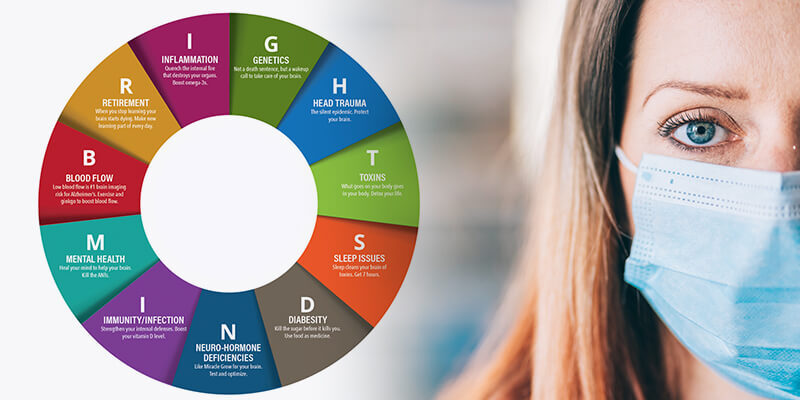
Today I want to look deeper at the M in Dr. Amen’s BRIGHT MINDS Strategy and add what he says are the four circles to help us with implementing these important health and wellness strategies. All this work can seem like a lot but if we can think of these 4 circles, it makes this all easier to understand, and with time, you’ll see how thinking with our brain health in mind will eventually become a habit.
THE 4 CIRCLES OF HEALTH
We opened up this episode with a quote from a doctor who mentioned the importance of thinking about these 4 circles. Dr. Joseph Maroon said that:
“By recommending that we balance our choices in biological (diet and exercise), psychological (stress control), social (relationships) and spiritual components in our lives, (Dr. Daniel Amen) provides a desperately needed roadmap to maximize brain health.” Joseph C Maroon, MD from Dr. Daniel Amen’s book, The End of Mental Illness.
Dr. Amen says he first learned about these 4 circles in 1978 when he started medical school, and was told by Dr. Sid Garrett to “always think of people as whole beings, never just as their symptoms…always take into consideration the four circles of health and illness.” (Dr. Amen, The End of Mental Illness).
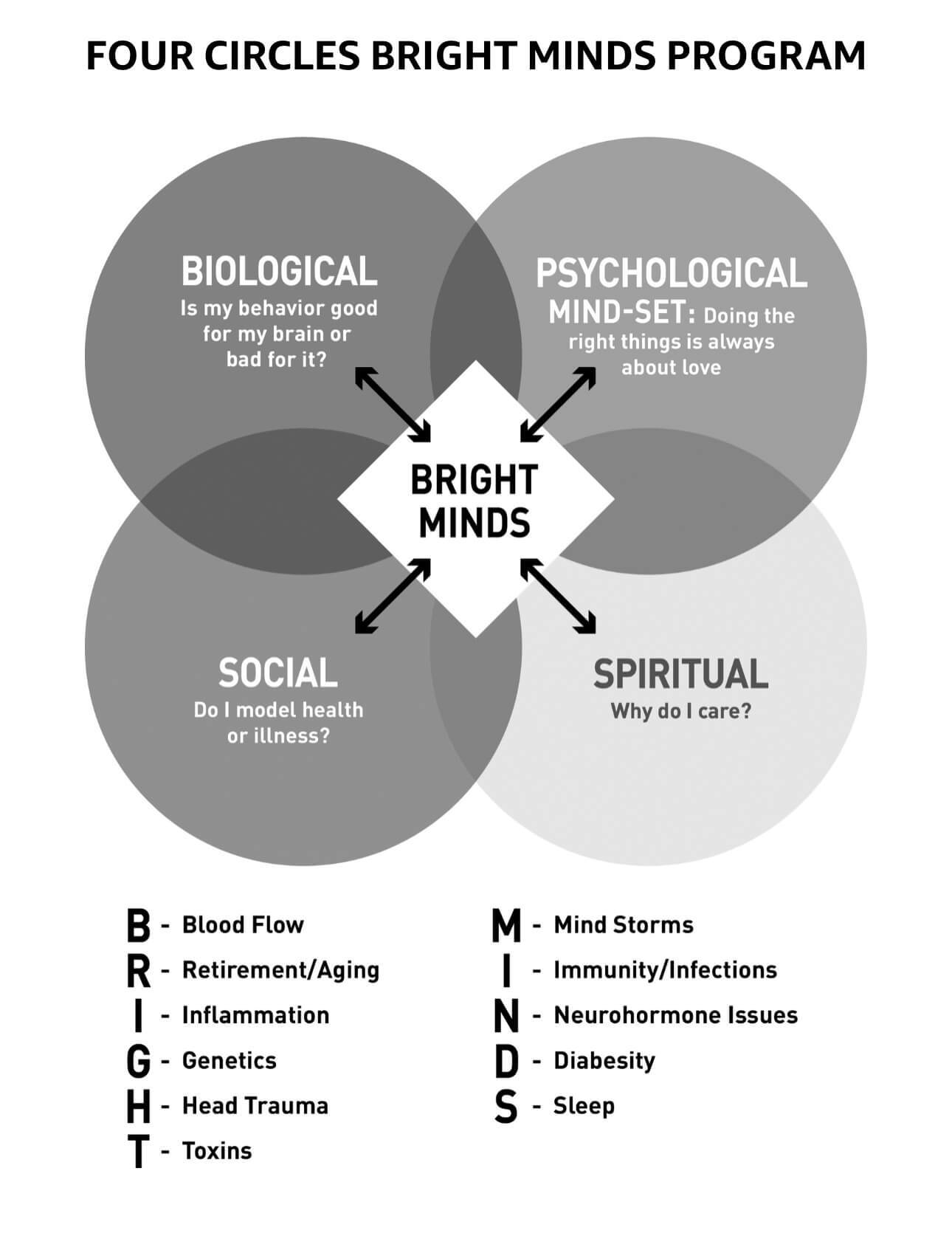
IMAGE CREDIT: Dr. Daniel Amen's The End of Mental Illness
- Biological: Where we think “Is my behavior good for my brain or bad for it?” This is where I think about healthy eating, exercise, intermittent fasting and doing the things I know are good for my brain, because I really do care about it.
PUT THIS INTO ACTION
We cover this topic in depth on a BONUS EP[xiv] with a Deep Dive into the Top 5 Health Staples. I know I need to add stress management to this list. What about you? How are you looking after this part of your brain health?
- Psychological Mindset: That includes “how we talk to ourselves—as well as our self-concept, body image, past emotional traumas, upbringing and significant developmental events.” (Page 81, The End of Mental Illness). This is where the work I’m doing with Dr. Leaf’s 5 steps to Cleaning Up My Mental Mess comes in. I’m always thinking, feeling and choosing in the direction of more love, peace, and freedom of mind, which takes some work when something comes in and stops my peaceful thinking.
PUT THIS INTO ACTION
Dr. Amen brings up Eckhart Tolle’s concept of the “pain-body” that I talked about on EP #281[xv] WITH Dr. Sean Sullivan who taught us how to shift our mindset in 10 minutes or less. We talked about how we all have these “pain-bodies” living inside us (Eckhart Tolle) and once we can see what they are (through Dr. Leaf’s work-where they show up as our Origin Story) then we “just observe these pain-bodies (or toxic thoughts) in the present moment” (Tolle) and we will notice that over time, their “energy will decrease.” (Tolle) This is mind-management in action. Once we’ve cleaned up our mental mess, we can go on to teach this concept to others. The idea of “I’m not good enough” used to show up ALL the time as the root cause of most of my stresses and anxieties, until I uncovered it, and this “pain-body” that developed over time in me, no longer affects me….at all! What about you? Are you aware of the pain-bodies or toxic thoughts that hold you back? Have you begun to clean them up?
- Social: We’ve all heard that “you become like the people with whom you spend the most time” (Dr. Amen) and you will be well aware of those who lift you up, versus pull you down.
PUT THIS INTO ACTION
While I don’t have much time for the social part of life, I do make it a priority to keep the social connections that are important to me strong. Also, putting my spare time into this podcast helps me to connect with others around the world on a deeper level. What about you? How do you keep your social connections strong?
- Spiritual: We’ve talked about this one often on this podcast. I’ve heard from so many of our guests that we are “spiritual beings having a human experience.” This we just can’t ignore. Dr. Amen points to Viktor Frankl’s Man’s Search for Meaning book to explain this one, (page 94, The End of mental Illness) reminding us to do the following:
- Find purposeful work where you are productive.
- Love the people who are central to your life.
- Find courage in the face of difficulty (and help others to shoulder theirs).
PUT THIS INTO ACTION
Finding purposeful work is easy for me, as the podcast helps me to keep working towards improving myself and sharing it with others. This keeps me busy and I do feel the connection that extends far beyond myself here. What about you? What’s your purpose? How do you find more meaning in your day to day life?
CONNECTING DR. AMEN and DR. LEAF’S WORK TOGETHER:
To close out this episode, now that we have these 4 circles in mind, (showing us that we are whole beings-our biological side, our psychological, social and spiritual side). Let’s revisit the acronym BRIGHT MINDS (a guide for well-being with the brain in mind) and look closer at what the “M” stands for, and see how we connect Dr. Leaf’s work, to Dr. Amen’s, for a stronger, healthier mind.
M-That stands for Mental Health is what Dr. Amen calls MIND STORMS. I love his analogy for our mental health, especially after looking at that graphic with the all of the mess in our minds showing up like a colorful ball. Since we’ve been focused on our Mental Health the past few episodes, I wonder what Dr. Amen would suggest we do to help us to Clean Up Our Mental Mess. Chapter 11 of The End of Mental Illness goes deep into WHY these storms happen in our brain, and WHAT can cause them, I want to focus on ways he suggests we prevent them from happening in the first place, since I think they complement Dr. Leaf’s 5 STEP Approach.
While Cleaning Up Our Mental Mess, there are things we can do to help our brain/minds to improve, and things we can do that hurt our progress. Dr. Amen suggests “avoiding anything that increases mind storms” (p 210 The End of Mental Illness) like “stress, tiredness, lack of sleep, alcohol, drug abuse, low or high blood sugar states, missing meals, and excessive screen time.” (Page 210). We all know what makes us feel “off” in our lives, and our mental health is centered around doing what makes us feel better, or good, and have more clarity of mind. I know what increases my MIND STORMS, making my mind messier than usual, and what keeps my mind clear and peaceful. As I’m now in my 52nd year of life, I want the ability to think clearly every day, so I can keep learning new ideas, and building a better version of myself, so when I find something that works, I’m sticking to it.
Here are my top habits that help keep MIND STORMS out of my head and prevent mental messes from happening in the first place.
CREATING HABITS THAT LIMIT OUR MENTAL MESS or MIND STORMS:
- CARING ABOUT OUR BRAIN: Just by caring about my brain, I think about the daily choices I’m making. When eating something, I’ll ask “will this help, or hurt my brain” and think hard about whether It’s worth creating a MIND STORM over a certain choice. If I create a mind storm, I just know I’ll have to spend extra time cleaning it up, so it’s easier to avoid what I know hurts me at this point.
- KNOW WHAT CAUSES OUR MENTAL MESS or MIND STORMS: It’s easy enough to know what makes me feel CLEAR and FOCUSED, vs CLOUDY and DISTRACTED. I just avoid things that steal my MENTAL CLARITY (replacing alcohol with non-alcoholic beverages, or sticking to my morning exercise routine that gives me a burst of energy/clarity throughout the day).
- DO MORE OF WHAT PREVENTS MENTAL MESS or MIND STORMS: Once you know what keeps your mind clear, keep doing that. For me, it’s daily exercise, eating low glycemic foods that keep my blood sugar from spiking, or higher fat foods that keep me fuller and less likely to eat the wrong thing, daily meditation, working on at least 7 hours of sleep at night, and pain management strategies for anything on my body that hurts (chiropractor, massage therapy, stretches, tools for self-care) that keep my mind strong and clear… AVOIDING MIND STORMS FOR ME.
- REGULARLY CLEANING UP OUR MENTAL MESS TO PREVENT BIGGER MIND STORMS IN THE FUTURE: Using Dr. Leaf’s scientifically proven 5 STEP PROCESS and Neurocycle App because I know I’m not always going to make the right choice, and I’ll have a MIND STORM at some point. So MIND-MANAGEMENT is something I add to my routine for those days when something gets past the gate, or when something unexpected comes my way, and needs my attention.
With these final thoughts, I’ll chose out this episode and ask you. What do you do that PREVENTS your MIND from getting messy? I’d love to hear your strategies, and what’s working. And with that, I’ll close out this episode, and see you sometime next week.
In the meantime, once you have practiced Cleaning Up Your Mental Mess, I highly recommend Dr. Amen’s New Brain Thrive Course, and Dr. Leaf’s New Book to help our children clean up their mental mess.
FOLLOW ANDREA SAMADI:
YouTube Channel: https://www.youtube.com/c/AndreaSamadi
Website https://www.achieveit360.com/
LinkedIn: https://www.linkedin.com/in/samadi/
Facebook: https://www.facebook.com/Achieveit360com
Neuroscience Meets SEL Facebook Group https://www.facebook.com/groups/2975814899101697
Twitter: https://twitter.com/andreasamadi
Instagram: https://www.instagram.com/andreasamadi/
RESOURCES:
Dr. Amen’s NEW BRAIN THRIVE COURSE https://offers.amenuniversity.com/bt5-headstart/
Dr. Caroline Leaf’s NEW Book for Children https://www.mentallyresilientkids.com/
REFERENCES:
[i] Neuroscience Meets SEL Episode #128 https://andreasamadi.podbean.com/e/review-of-dr-daniel-amens-the-end-of-mental-illness-6-steps-for-improved-brain-and-mental-health/
[ii] Dr. Amen, Brain Thrive by 25 Online Course http://brainthriveby25.com/
[iii] Neuroscience Meets SEL Episode #299 https://andreasamadi.podbean.com/e/brain-fact-friday-on-a-deep-dive-into-dr-carolyn-leaf-s-5-scientifically-proven-steps-to-clean-up-our-mental-mess-so-we-can-help-our-children/
[iv] Amen University https://offers.amenuniversity.com/bt5-headstart/
[v]https://www.cdc.gov/suicide/facts/index.html#:~:text=Suicide%20affects%20people%20of%20all,%2D14%20and%2020%2D34.
[vi] The 5-Step Process to Managing Trauma with Dr. Caroline Leaf on The Brain Warrior’s Way Podcast Published on YouTube May 22, 2020 https://www.youtube.com/watch?v=u_sHPAvOXh4&t=2661s
[vii] Andrea Samadi’s Pre-released episode for Podbean’s Wellness Week Nov.27, 2020 https://podcastwellnessweek.podbean.com/e/what-everyone-must-know-about-the-top-mental-health-staples-to-accelerate-productivity-and-results/
[viii]Neuroscience Meets SEL Episode #229 https://andreasamadi.podbean.com/e/brain-fact-friday-on-a-deep-dive-into-dr-carolyn-leaf-s-5-scientifically-proven-steps-to-clean-up-our-mental-mess-so-we-can-help-our-children/
[ix] https://en.m.wikipedia.org/wiki/Nemo_dat_quod_non_habet
[x] Sabrina Cardone https://www.instagram.com/p/Cv902OLALiZ/?hl=en
[xi] https://andreasamadi.podbean.com/e/how-a-brain-scan-changed-my-brain-and-life-with-doug-sutton/
[xii] https://andreasamadi.podbean.com/e/how-exactly-can-a-spect-imaging-brain-scan-change-your-life-with-andrea-samadi-part-2/
[xiii] https://andreasamadi.podbean.com/e/how-a-spect-scan-can-change-your-life-part-3-with-andrea-samadi/
[xiv] https://andreasamadi.podbean.com/e/bonus-episode-a-deep-dive-into-the-top-5-health-staples-and-review-of-seasons-1-4/
[xv]Neuroscience Meets SEL Episode #281 https://andreasamadi.podbean.com/e/psychologist-dr-sean-sullivan-andfounder-of-oneperfectshiftcom-on-how-to-shift-to-a-better-state-of-mind-in-10-minutes-anytime/
Comments (0)
To leave or reply to comments, please download free Podbean or
No Comments
To leave or reply to comments,
please download free Podbean App.